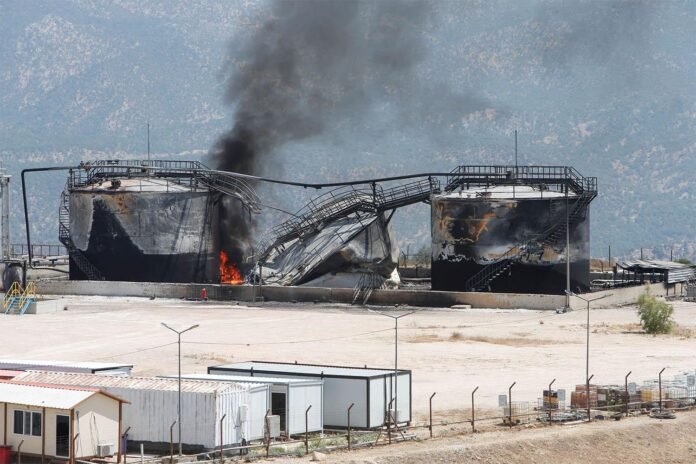Oil production in Iraq’s Kurdistan Region has suffered a massive blow. Following a wave of drone strikes, Kurdistan oil output has plummeted by nearly 70 percent. This dramatic decline has reduced production from 280,000 barrels per day to only 81,000.
The attacks targeted critical oil infrastructure across the region. Between July 14 and 17, 58 drones struck several oil sites in Erbil and Duhok provinces. These strikes caused severe damage, disrupted operations, and halted production at several major fields. Fortunately, no casualties were reported, but the damage left oil operations in crisis.
Several major oil fields were affected. Sheikhan, which previously produced 40,000 barrels per day, now lies nearly silent. Tawke and Peshkabir, once yielding 29,000 and 54,000 barrels respectively, also reported drastic reductions. The Khurmala field, with a typical output of 100,000 barrels per day, suffered heavy losses. Sarsang, usually producing 30,000 barrels, was also hit hard.
These numbers were shared during a recent visit by an Iraqi government delegation to Kurdistan. The ECO Iraq Observatory revealed the details and highlighted the scale of destruction caused by the drone attacks.
Although no group has claimed responsibility, fingers point toward Iran-backed factions. These groups, however, have denied any involvement. Tensions remain high as officials attempt to identify those responsible. The continued silence over responsibility has left regional leaders frustrated and searching for answers.
In response, Baghdad has launched a formal investigation into the incidents. The central government has also urged the Kurdistan Regional Government to strengthen security around key oil facilities. Officials emphasized that protecting vital energy infrastructure must become a top priority.
This crisis has broader economic implications. Kurdistan oil output plays a crucial role in Iraq’s energy exports and revenue. A prolonged disruption could harm the country’s economy and reduce its global oil presence. This incident underscores the vulnerability of critical resources to modern warfare tactics like drone strikes.
Looking ahead, restoring damaged fields and securing facilities will require time and resources. Until then, Kurdistan oil output will likely remain below normal levels. The region now faces the difficult task of balancing immediate recovery with long-term security improvements.
This attack marks one of the most significant blows to Iraq’s energy sector in recent years. Without swift action, similar attacks could further destabilize both local operations and national economic goals.

